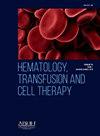血友病 A 和抑制剂患者免疫耐受诱导期间的小型外科手术:巴西免疫耐受(BrazIT)研究队列的结果。
IF 1.8
Q3 HEMATOLOGY
引用次数: 0
摘要
导言:手术与 A 型血友病患者体内抗因子 VIII(FVIII)中和抗体(抑制剂)的产生有关,而免疫耐受诱导(ITI)治疗是根除这些抑制剂的推荐疗法。我们评估了 ITI 期间进行的外科手术与治疗结果之间的关联:患者按照巴西 ITI 方案接受治疗,治疗结果被定义为成功(即对外源性 FVIII 恢复反应)和失败(即对外源性 FVIII 无反应,因此需要旁路药物控制出血)。诱导治疗期间的外科手术按照国际建议进行管理:结果:163 名患者的治疗成功率为 68.7%;33 人(20.2%)接受了 43 次小手术(96%)和 2 次大手术。在使用 ITI 期间是否接受手术治疗的患者的个人、血友病、抑制剂和治疗特征相似;成功率分别为 72.7 % 和 67.7 %(P 值 = 0.577):结论:小手术与 ITI 治疗结果之间没有关联。本文章由计算机程序翻译,如有差异,请以英文原文为准。
Minor surgical procedures during immune tolerance induction in people with hemophilia A and inhibitors: results from the Brazilian Immune Tolerance (BrazIT) study cohort
Introduction
Surgeries are implicated in the development of anti-factor VIII (FVIII) neutralizing antibodies (inhibitors) in hemophilia A individuals with immune tolerance induction (ITI) treatment being the recommended therapy to eradicate these inhibitors. We evaluated the association of surgical procedures performed during ITI and treatment outcome.
Methods
Patients were treated according to the Brazilian ITI Protocol with outcomes being defined as successful (i.e., recovered responsiveness to exogenous FVIII) and failed (i.e., unresponsiveness to exogenous FVIII thus requiring bypassing agents for bleeding control). Surgical procedures during induction therapy were managed following international recommendations.
Results
Treatment success rate was 68.7 % in 163 patients; 33 (20.2 %) were submitted to 43 (96 %) minor and two major surgeries. Personal, hemophilia, inhibitor, and treatment characteristics were similar between patients submitted to surgical procedures or not while on ITI; the success rates were 72.7 % and 67.7 % (p-value = 0.577), respectively.
Conclusion
No association was found between having a minor surgical procedure and ITI treatment outcome.
求助全文
通过发布文献求助,成功后即可免费获取论文全文。
去求助
来源期刊

Hematology, Transfusion and Cell Therapy
Multiple-
CiteScore
2.40
自引率
4.80%
发文量
1419
审稿时长
30 weeks
 求助内容:
求助内容: 应助结果提醒方式:
应助结果提醒方式:


